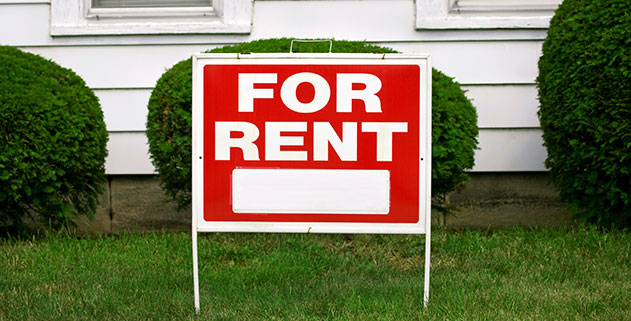For many people, renting instead of buying proves to be a cost-effective way to put a roof over their heads.
Renting certainly has its potential benefits. For some people, the lower cost of renting allows them to save up to buy a home. In other cases, renters have no choice but to rent.
And even for others, renting allows them to flexibility to move from place to place without the pain of buying and selling a home.
Sometimes it's a combination of many factors.
The truth remains, for many Americans, paying the rent is an unavoidable reality in their monthly life cycle.
These days, being a renter means facing a cyclical reality of maybe never owning a home. That's because it becoming increasingly more difficult for renters to save any money to buy a place of their own because their rent continues to rise.
In some cases, skyrocketing rents are driving younger renters to move back in with their parents.
In April, Shaun Donovan, then the Secretary of the United States Department of Housing and Urban Development, called the current environment “the worst rental affordability crisis this country has ever known.”
According to a recent discussion hosted by CoreLogic (CLGX) along with the Urban Institute, a Washington, D.C.-based nonpartisan economic and social policy research organization, the cost of rent is going to continue to rise.
“Overall, housing dynamics are currently changing,” Corelogic’s Chief Economist Mark Fleming said in July. “Rental demand is rising while supply is dwindling, as a result of the declining share of distressed assets relative to all homes on the market. Due to this trend, rent prices will continue to climb.”
The rising cost has been a constant topic of discussion on both coasts, with New York City, San Francisco and Miami constantly among the cities with the highest rent and the highest rate of rent growth.
But the rising cost of rent is hitting the heartland as well, according to a new report from The Wall Street Journal.
Nashville, Tennessee; Raleigh, North Carolina; Louisville, Kentucky; Columbus, Ohio; and St. Louis all placed in the top 10 regions for the most rent growth in the second quarter, the article states.
Economists say landlords in these southern and Midwestern cities are able to pass through large rent increases because of strong demand. "Job growth has picked up, unemployment's declined. There's still solid demand created by…people losing single-family homes and going into rentals," said Mark Zandi, chief economist at Moody's Analytics. "That's giving landlords the upper hand."
And the demand for housing in the center of the country is continuing to rise as more corporations flee the coasts for the tax breaks and lower cost of living that Middle America boasts.
The residents of those cities certainly won’t complain about there being more jobs available, but more of their paychecks are being passed directly to their landlords.
Locals complain that the rents are taking a bigger bite out of their paychecks. While apartment rents are up 18% since 2009, median household income in the Nashville metro area has grown by 5% to $53,671, according to Moody's Analytics. More than half of renter households in the Nashville metro area are considered cost-burdened, meaning they pay more than 30% of their income to rent.
On the positive side though, making all of those rent payments may prove to make it a little easier to buy a home down the road. As HousingWire reported last week, the top credit reporting agencies are considering adding rental history to their metrics for computing credit scores.
According a Businessweek report, Experian published an analysis on almost 20,000 people in government-subsidized housing who pay their monthly rent on time. The survey found that before adding in rental history, 11% of the same had no credit file at all, which makes it extremely hard to get loans. However, once the rental history was included, 59% of that group had prime credit scores, and another 38% had “nonprime” scores, while only 3% were considered subprime.
And with additional credit score calculation methodologies being put in place by FICO and VantageScore, it may prove easier for renters to escape escalating rents and buy a home.
In the mean time, renters in Nashville are being forced to move back in with their parents because they can’t afford to rent. From the Wall Street Journal:
Becky Ogbaide, a 22-year-old who works at the front desk of a Nashville hotel, estimates that she pays almost half of her income to rent an apartment in Murfreesboro, a suburb of Nashville. A senior at Middle Tennessee State University, Ms. Ogbaide will soon be moving back in with her parents because her landlord is raising her rent by 13%. "It really puts a lot of stress on us. Is it worth it?"
Those types of anecdotes shouldn’t come as a surprise for anyone who monitors the housing industry closely. In fact, 2014 is shaping up to be a tough year for housing.
According to a recent report from FBR & Co., we could see an origination volume of approximately $633 billion in 2014. That's a troublingly low number.
“With approximately $112 billion of originations in the month of July alone, we believe third quarter is well on its way to surpassing 2Q results,” FBR tells clients. “That said, we expect August and September to slow relative to July. Should these prove as strong, our outlook for FY14 industry origination volumes could improve from our current expectation for a sub $1 trillion market.”
And for a housing market that is on track for an underwhelming year, the sooner the renters move out of mom and dad’s place or out of their expensive apartment and into a place of their own, the better.





